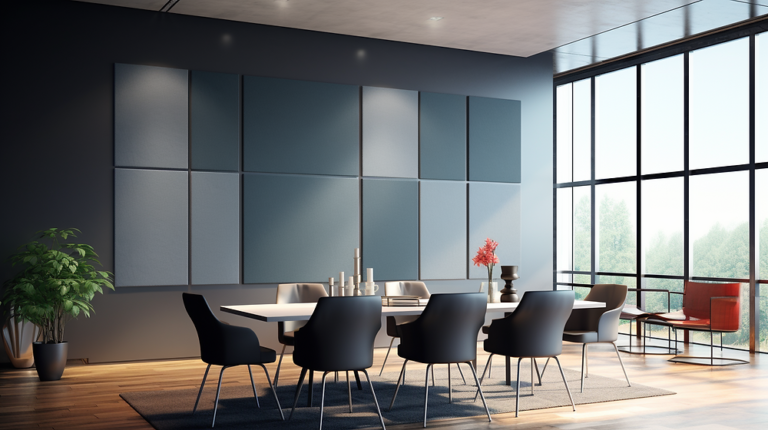Soundproof panels are a popular solution for reducing noise levels in various environments, such as recording studios, offices, and homes. While their primary function is to absorb sound waves and prevent them from bouncing off surfaces, there are also other benefits to using soundproof panels.
One of the most significant advantages of soundproof panels is their ability to improve speech intelligibility. When sound waves are absorbed by the panels, they prevent echoes and reverberations, making it easier for people to hear and understand each other. This is particularly important in spaces where communication is essential, such as conference rooms, classrooms, and lecture halls.
Another benefit of soundproof panels is their ability to enhance the acoustic quality of a room. By reducing unwanted noise and improving sound clarity, they can create a more pleasant and comfortable environment. This is especially important in spaces where people spend a lot of time, such as homes and workplaces. Overall, soundproof panels are a versatile solution that can provide numerous benefits beyond just reducing noise levels.
Enhanced Privacy and Comfort
Soundproof panels have many benefits, including enhanced privacy and comfort. In this section, we will discuss two key ways in which soundproof panels can improve privacy and comfort: reduction of noise transmission and creation of quiet zones.
Reduction of Noise Transmission
One of the most significant benefits of using soundproof panels is their ability to reduce noise transmission. This is particularly important in environments where privacy is essential, such as offices, conference rooms, and medical facilities.
Soundproof panels are designed to absorb sound waves and prevent them from travelling through walls and ceilings. This means that conversations and other noises are less likely to be heard in adjacent rooms, providing a more private and comfortable environment for everyone.
Creation of Quiet Zones
Another benefit of using soundproof panels is the creation of quiet zones. These are areas where noise is minimised, allowing people to work, study, or relax in peace.
Quiet zones can be created in a variety of environments, from open-plan offices to homes and schools. By using soundproof panels to block out noise from outside sources, such as traffic or construction, it is possible to create a peaceful and productive environment that promotes concentration and relaxation.
In conclusion, soundproof panels offer many benefits when it comes to enhancing privacy and comfort. By reducing noise transmission and creating quiet zones, they can help to create a more peaceful and productive environment for everyone.
Improved Acoustic Quality
Soundproof panels not only reduce noise pollution but also improve the acoustic quality of a room. This makes them an ideal choice for spaces that require clear and precise audio, such as recording studios, conference rooms, and lecture halls.
Clarity in Speech and Audio
Soundproof panels absorb sound waves, preventing them from bouncing off walls and creating echoes. This results in clearer speech and audio, making it easier for people to understand each other and for recordings to be of higher quality.
In addition, soundproof panels can also eliminate background noise, making it easier for listeners to focus on the main speaker or audio source. This can be especially beneficial in noisy environments, such as busy offices or restaurants.
Controlled Reverberation
Reverberation is the persistence of sound in a room after the original sound has stopped. While some reverberation can be desirable in certain settings, too much can create a muddled and unclear sound.
By reducing the amount of sound waves bouncing around a room, soundproof panels can help control reverberation. This allows for a more controlled and precise sound, making it easier to distinguish individual sounds and voices.
Overall, improved acoustic quality is just one of the many benefits of using soundproof panels. Whether for professional or personal use, they can help create a more pleasant and functional environment by reducing noise pollution and improving sound clarity.


Comments are closed.